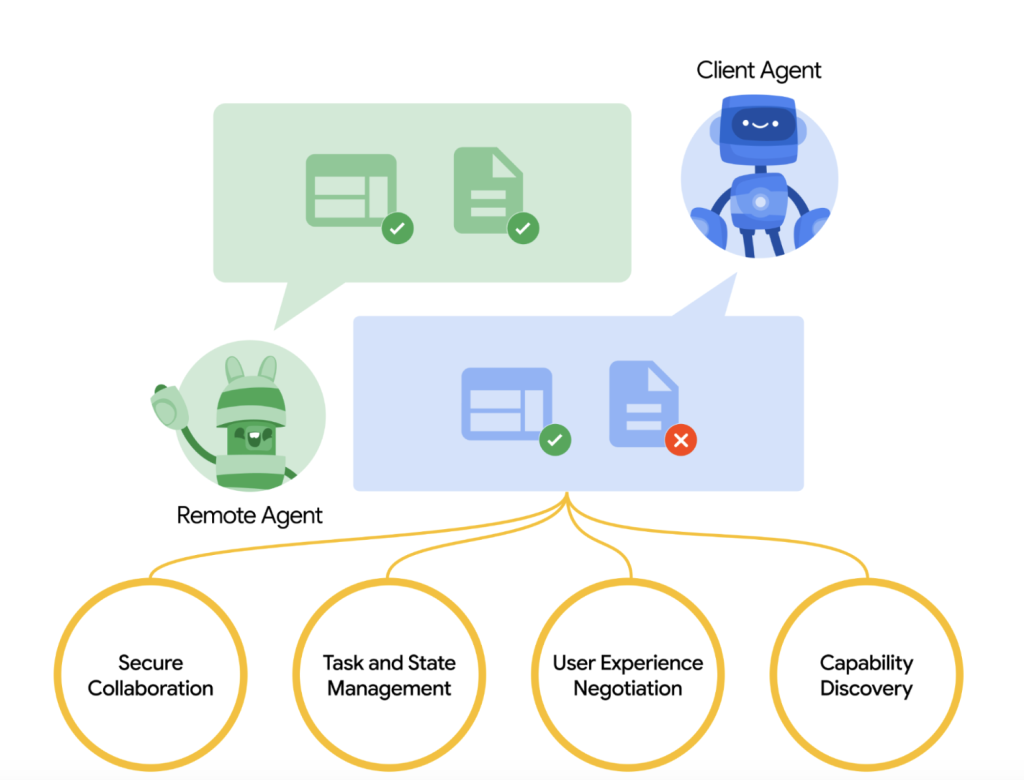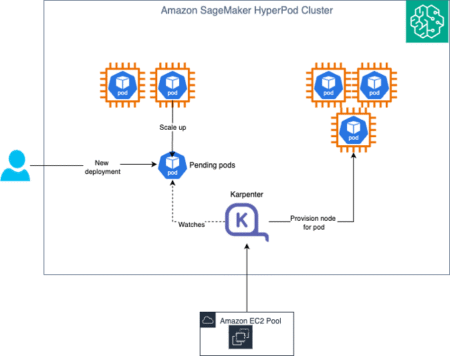Google AI recently announced Agent2Agent (A2A), an open protocol designed to facilitate secure, interoperable communication among AI agents built on different platforms and frameworks. By offering a standardized approach to agent interaction, A2A aims to streamline complex workflows that involve specialized AI agents collaborating to complete tasks of varying complexity and duration.
A2A addresses a key challenge in the AI domain: the lack of a common mechanism for agents to discover, communicate, and coordinate across vendor ecosystems. In many industries, organizations often deploy multiple AI systems for specific functions, but these systems do not always integrate smoothly. A2A is intended to close this gap by providing a universal set of rules for agent interoperability, such that agents created by different teams or companies can work in tandem without custom integrations.
A prominent feature of A2A is its enterprise-grade focus. The protocol supports long-running tasks that extend over days, weeks, or even months—such as supply chain planning or multi-stage hiring. It also accommodates multimodal collaboration, so AI agents can share and process text, audio, and video in a unified workflow. By using Agent Cards in JSON format, agents can advertise their capabilities, security permissions, and any relevant information required to handle tasks. This approach allows each agent to quickly assess whether it can perform a given task, request additional resources, or delegate responsibilities to other capable agents.
Security is another central aspect of A2A. AI systems frequently deal with sensitive data, such as personal information in hiring or customer records in finance. To address these requirements, A2A aligns with OpenAPI-level authentication standards, enforcing role-based access control and encrypted data exchanges. This approach aims to ensure that only authorized agents, possessing the correct credentials and permissions, can participate in critical workflows or access protected data streams.

To guide its development, A2A is built around five core design principles:
- Agentic-first: Agents do not share memory or tools by default. They operate independently and communicate explicitly to exchange information.
- Standards-compliant: The protocol uses widely adopted web technologies, such as HTTP, JSON-RPC, and Server-Sent Events (SSE), to minimize friction for developers.
- Secure by default: Built-in authentication and authorization measures are intended to safeguard sensitive transactions and data.
- Handles short and long tasks: A2A supports both brief interactions (like a quick information request) and extended processes that require ongoing collaboration.
- Modality-agnostic: Agents can handle text, video, audio, or other data types by sharing structured task updates in real time.
From a technical standpoint, A2A can be seen as complementary to other emerging standards for AI multi-agent systems. For instance, Anthropic’s Model Context Protocol (MCP) focuses on how different language models handle shared context during multi-agent reasoning. A2A’s emphasis lies in the interoperability layer, ensuring agents can securely discover one another and collaborate once models are ready to exchange data or coordinate tasks. This combination of context sharing (MCP) and inter-agent communication (A2A) can form a more comprehensive foundation for multi-agent applications.
An example of a real-world application for A2A is the hiring process. One agent might screen candidates based on specific criteria, another could schedule interviews, while a third might manage background checks. These specialized agents can communicate through a unified interface, synchronizing the status of each step and ensuring that relevant information is passed along securely.
Google has open-sourced A2A to encourage community involvement and standardization across the AI industry. Key consulting and technology firms—including BCG, Deloitte, Cognizant, and Wipro—are contributing to its development, with the goal of refining interoperability and security features. By taking this collaborative approach, Google aims to lay the groundwork for a more flexible and efficient multi-agent ecosystem.
Overall, A2A offers a structured way for organizations to integrate specialized AI agents, enabling them to exchange data securely, manage tasks more effectively, and support a broad range of enterprise requirements. As AI continues to expand into various facets of business operations, protocols like A2A may help unify disparate systems, fostering more dynamic and reliable workflows at scale.
Check out the Technical details and Google Blog. All credit for this research goes to the researchers of this project. Also, feel free to follow us on Twitter and don’t forget to join our 85k+ ML SubReddit.
The post Google Introduces Agent2Agent (A2A): A New Open Protocol that Allows AI Agents Securely Collaborate Across Ecosystems Regardless of Framework or Vendor appeared first on MarkTechPost.
Source: Read MoreÂ

 [Register Now] miniCON Virtual Conference on OPEN SOURCE AI: FREE REGISTRATION + Certificate of Attendance + 3 Hour Short Event (April 12, 9 am- 12 pm PST) + Hands on Workshop [Sponsored]
[Register Now] miniCON Virtual Conference on OPEN SOURCE AI: FREE REGISTRATION + Certificate of Attendance + 3 Hour Short Event (April 12, 9 am- 12 pm PST) + Hands on Workshop [Sponsored]
